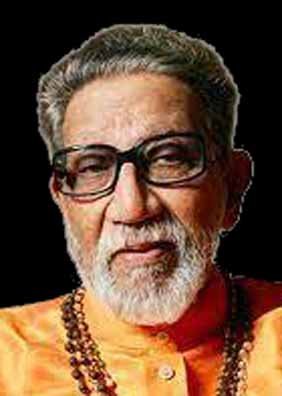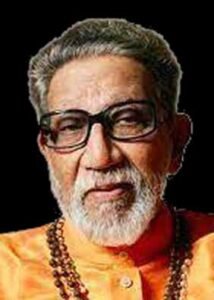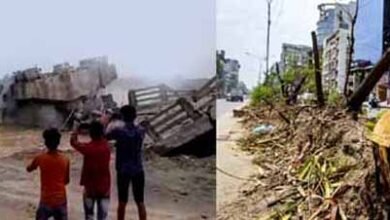
Bal Keshav Thackeray…
Amidst the relentless pace of the never-sleeping metropolis of Mumbai, a political heavyweight surfaced who would forever alter the political terrain of Maharashtra, a formidable figure, the founder of the Shiv Sena and a captivating leader was Balasaheb Thackeray. Balasaheb, who was born in Pune on January 23, 1926, would later influence the fate of the state and its citizens.
Balasaheb’s creative prowess was evident in his early years. He was a talented cartoonist who developed his political satirical abilities while employed at the Free Press Journal in the 1950s. His cartoons offered a potent reflection on the socio-political climate of the day in addition to being simple pictures. Nobody could have predicted that this artist would soon become a powerful political figure.
The establishment of the Shiv Sena in 1966 signaled a sea change in Maharashtra politics. Balasaheb established the party to fight for the rights of the working class and to promote the interests of the Marathi manoos, or persons of Marathi descent. Under his energetic leadership, the Shiv Sena became an influential force that was hard to ignore and quickly acquired popularity.
The 1970 Bombay riots were one of the turning points in Balasaheb’s political career. Violence broke out as a result of long-simmering tensions between the Marathi-speaking populace and immigrants, particularly those from South India. The Shiv Sena gained more popularity because of its pro-Marathi attitude. Balasaheb’s status as a populist leader was cemented by his ability to transform the anger of the Marathi youth into a potent political force.
The Shiv Sena gained traction outside of Maharashtra in the 1980s. Uddhav Thackeray, the son of Balasaheb, was crucial to the party’s expansion. The Sena’s political astuteness was demonstrated by its membership in Mumbai’s civic body and its eventual takeover of the Brihanmumbai Municipal Corporation (BMC). A sizable portion of the populace identified with Balasaheb’s vision of a Maharashtra for Maharashtrians.
But there was some controversy about Balasaheb Thackeray. He received criticism for his harsh and frequently divisive speech, particularly for his views on non-Marathi people. He was criticized for encouraging local bigotry and dividing people on the basis of language and race. Balasaheb remained unrepentant in the face of criticism, seeing himself as a protector of Marathi identity and culture.
Maharashtra’s political landscape underwent a fundamental shift in the 1990s. The Shiv Sena formed coalitions and became a major force in state politics during the coalition era. Balasaheb’s desire of having a Sena chief minister in Maharashtra was fulfilled in 1995 when the Sena-BJP coalition scored a historic victory and Manohar Joshi took office.
The impact of Balasaheb Thackeray went beyond politics. Not only was he well regarded for his political abilities but also for his charm and humor in Maharashtra. His humor and sarcasm-laced lectures were well received by large audiences. Balasaheb used “Saamana,” the Shiv Sena publication, as a forum to express his ideas to the public directly.
Changes and difficulties arose with the turn of the century. As Balasaheb’s health started to deteriorate, his son Uddhav Thackeray became more involved in the party. An era in Maharashtra politics came to an end on November 17, 2012, with the passing of Balasaheb Thackeray. Thousands of mourners flocked to Mumbai’s streets to say goodbye to their cherished leader.
Balasaheb Thackeray’s legacy lives on via the Shiv Sena, which is still very much involved in Maharashtra politics. The party’s current head, Uddhav Thackeray, has continued his father’s goal while taking a more practical tack. The party has changed throughout time to reflect the shifting political landscape in the state.
The influence of Balasaheb Thackeray goes beyond politics and into Maharashtra’s cultural fabric. His enduring impact includes the Shiv Sena’s role in Mumbai’s growth and its attempts to maintain Marathi culture. Balasaheb Thackeray had a huge influence on Maharashtra politics, regardless of one’s opinion of him—as a divisive character who incited controversy or as a charismatic leader who fought for the rights of the Marathi manoos. His life and contributions are being researched, evaluated, and celebrated today, influencing future generations’ interpretations of Maharashtra’s political history.
Dr.(Prof.) Jai Ram Jha (Editor).
============ ============ ============
बाल केशव ठाकरे…
 कभी न सोने वाले महानगर मुंबई की निरंतर गति के बीच, एक राजनीतिक दिग्गज सामने आया जिसने महाराष्ट्र के राजनीतिक परिदृश्य को हमेशा के लिए बदल दिया, एक दुर्जेय व्यक्ति, शिव सेना के संस्थापक और एक आकर्षक नेता बालासाहेब ठाकरे थे. बालासाहेब, जिनका जन्म 23 जनवरी, 1926 को पुणे में हुआ था, ने बाद में राज्य और उसके नागरिकों के भाग्य को प्रभावित किया.
कभी न सोने वाले महानगर मुंबई की निरंतर गति के बीच, एक राजनीतिक दिग्गज सामने आया जिसने महाराष्ट्र के राजनीतिक परिदृश्य को हमेशा के लिए बदल दिया, एक दुर्जेय व्यक्ति, शिव सेना के संस्थापक और एक आकर्षक नेता बालासाहेब ठाकरे थे. बालासाहेब, जिनका जन्म 23 जनवरी, 1926 को पुणे में हुआ था, ने बाद में राज्य और उसके नागरिकों के भाग्य को प्रभावित किया.
बालासाहेब की रचनात्मक क्षमता उनके शुरुआती वर्षों में ही स्पष्ट हो गई थी. वह एक प्रतिभाशाली कार्टूनिस्ट थे. जिन्होंने वर्ष 1950 के दशक में फ्री प्रेस जर्नल में कार्यरत रहते हुए अपनी राजनीतिक व्यंग्यात्मक क्षमताओं का विकास किया. उनके कार्टून सरल चित्र होने के अलावा उस समय के सामाजिक-राजनीतिक माहौल पर एक सशक्त प्रतिबिंब प्रस्तुत करते थे. कोई भी यह अनुमान नहीं लगा सकता था कि यह कलाकार जल्द ही एक शक्तिशाली राजनीतिक हस्ती बन जाएगा.
वर्ष 1966 में शिव सेना की स्थापना ने महाराष्ट्र की राजनीति में एक बड़े बदलाव का संकेत दिया. बालासाहेब ने श्रमिक वर्ग के अधिकारों के लिए लड़ने और मराठी माणूस, या मराठी मूल के व्यक्तियों के हितों को बढ़ावा देने के लिए पार्टी की स्थापना की. उनके ऊर्जावान नेतृत्व में, शिव सेना एक प्रभावशाली ताकत बन गई जिसे नजरअंदाज करना मुश्किल था और उसने जल्द ही लोकप्रियता हासिल कर ली.
वर्ष 1970 के बॉम्बे दंगे बालासाहेब के राजनीतिक कैरियर के महत्वपूर्ण मोड़ों में से एक थे. मराठी भाषी आबादी और आप्रवासियों, विशेषकर दक्षिण भारत के आप्रवासियों के बीच लंबे समय से चल रहे तनाव के परिणामस्वरूप हिंसा भड़क उठी. अपने मराठी समर्थक रवैये के कारण शिवसेना को अधिक लोकप्रियता मिली. लोकलुभावन नेता के रूप में बालासाहेब की स्थिति मराठी युवाओं के गुस्से को एक शक्तिशाली राजनीतिक ताकत में बदलने की उनकी क्षमता से मजबूत हुई.
वर्ष 1980 के दशक में शिव सेना ने महाराष्ट्र के बाहर लोकप्रियता हासिल की. बाला साहेब के बेटे उद्धव ठाकरे पार्टी के विस्तार के लिए महत्वपूर्ण थे. सेना की राजनीतिक चतुराई का प्रदर्शन मुंबई के नागरिक निकाय में उसकी सदस्यता और अंततः बृहन्मुंबई नगर निगम (बीएमसी) पर उसके कब्जे से हुआ. आबादी का एक बड़ा हिस्सा महाराष्ट्रियों के लिए बालासाहेब के महाराष्ट्र के दृष्टिकोण से जुड़ा हुआ है.
लेकिन बाला साहेब ठाकरे को लेकर कुछ विवाद भी हुआ. उनके कठोर और अक्सर विभाजनकारी भाषण के लिए उन्हें आलोचना मिली, खासकर गैर-मराठी लोगों पर उनके विचारों के लिए. स्थानीय कट्टरता को प्रोत्साहित करने और लोगों को भाषा और नस्ल के आधार पर विभाजित करने के लिए उनकी आलोचना की गई. बालासाहेब खुद को मराठी अस्मिता और संस्कृति के रक्षक के रूप में देखते हुए, आलोचना के प्रति उदासीन रहे.
वर्ष 1990 के दशक में महाराष्ट्र के राजनीतिक परिदृश्य में बुनियादी बदलाव आया. शिवसेना ने गठबंधन बनाया और गठबंधन युग के दौरान राज्य की राजनीति में एक प्रमुख ताकत बन गई. महाराष्ट्र में सेना का मुख्यमंत्री बनाने की बालासाहेब की इच्छा वर्ष 1995 में पूरी हुई जब सेना-भाजपा गठबंधन ने ऐतिहासिक जीत हासिल की और मनोहर जोशी ने पदभार संभाला.
बाला साहेब ठाकरे का प्रभाव राजनीति से परे था. वह न केवल अपनी राजनीतिक क्षमताओं के लिए बल्कि महाराष्ट्र में अपने आकर्षण और हास्य के लिए भी काफी जाने जाते थे. उनके हास्य और व्यंग्य से भरपूर व्याख्यानों को बड़ी संख्या में दर्शकों ने खूब सराहा. बालासाहेब ने अपने विचारों को सीधे जनता के सामने व्यक्त करने के लिए एक मंच के रूप में, शिवसेना प्रकाशन “सामना” का उपयोग किया.
सदी के अंत के साथ परिवर्तन और कठिनाइयाँ उत्पन्न हुईं. जैसे-जैसे बालासाहेब का स्वास्थ्य बिगड़ने लगा, उनके बेटे उद्धव ठाकरे पार्टी में और अधिक शामिल होते गए. 17 नवंबर 2012 को बाला साहेब ठाकरे के निधन के साथ ही महाराष्ट्र की राजनीति में एक युग का अंत हो गया. अपने प्रिय नेता को अलविदा कहने के लिए हजारों शोक संतप्त लोग मुंबई की सड़कों पर उमड़ पड़े.
बालासाहेब ठाकरे की विरासत शिवसेना के माध्यम से जीवित है, जो अभी भी महाराष्ट्र की राजनीति में सक्रिय है. पार्टी के वर्तमान प्रमुख उद्धव ठाकरे ने अधिक व्यावहारिक रवैया अपनाते हुए अपने पिता के लक्ष्य को जारी रखा है. राज्य में बदलते राजनीतिक परिदृश्य को प्रतिबिंबित करने के लिए पार्टी समय-समय पर बदलती रही है.
बालासाहेब ठाकरे का प्रभाव राजनीति से परे महाराष्ट्र के सांस्कृतिक ताने-बाने तक है. उनके स्थायी प्रभाव में मुंबई के विकास में शिवसेना की भूमिका और मराठी संस्कृति को बनाए रखने के प्रयास शामिल हैं. बालासाहेब ठाकरे का महाराष्ट्र की राजनीति पर बहुत बड़ा प्रभाव था, भले ही उनके बारे में किसी की राय कुछ भी हो – एक विभाजनकारी चरित्र के रूप में जिसने विवाद को उकसाया या एक करिश्माई नेता के रूप में जो मराठी माणूस के अधिकारों के लिए लड़े. उनके जीवन और योगदान पर आज शोध, मूल्यांकन और जश्न मनाया जा रहा है, जो महाराष्ट्र के राजनीतिक इतिहास की भावी पीढ़ियों की व्याख्याओं को प्रभावित कर रहा है.
डॉ. (प्रो.) जय राम झा (संपादक).





